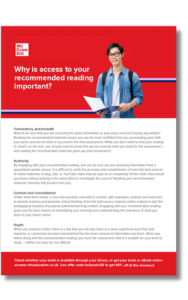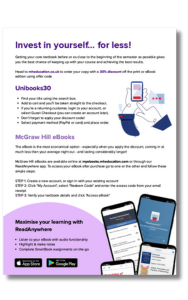Turning Minds to Turning Pages
Turning minds to turning pages – working together to save reading
Research by BibliU in 2021 revealed that 70% of students had skipped buying reading and learning materials, often citing affordability, but an equal number saying they felt it was a waste of money. Four years later, and the data we see on sell-through of textbooks that have been officially adopted is typically even lower than that – at least in print and standard eBook formats.
Students want more from their books
Naturally, in an age where even 10-year-olds carry a miniature supercomputer in their backpack and AI is an ever-available sage/ sidekick at our disposal, the traditional textbook may be starting to look a little flat and linear.
Not surprising then that in the same survey, 90% students said they felt textbooks should be provided digitally, with interactive features to enhance learning such as:
- in-book quizzes with adaptive questions to track progress (48%)
- a search option to quickly find quotes or diagrams (46%)
- text-to-speech, audiobooks or speed reader (40%).
The good news is that we can already help with things like this, and more, with a range of access options – from eBook collections via your library aggregator of choice, to McGraw Hill eBooks with integrated AI tools through our Read Anywhere app, to the full bells and whistles package of content, media, support and apps in Connect, integrated with your LMS.
Does reading make a difference?
In the US, where ‘Inclusive Access’ models at colleges and universities mean that reading materials are available from day one (course materials are charged for alongside tuition and fees unless they actively opt out, and access is negotiated by the institution directly with publishers at a discounted price), it has been possible to study the impact of this availability on exam scores. In other words – do students who do the reading do better?
Yes – they do.
Not only does it have an impact on academic preparedness and success – i.e., better grades, but course completion rates go up as well.
“We’ve seen a 3% decrease in students withdrawing from courses in the first 12 class days because of day-one access. In the last four of five years, we’ve also seen about a 10% increase in completion rates,” says the Senior Vice Provost of Academic Services at Dallas College.
A peer reviewed study at Onondaga Community College and Technical College of the Lowcountry: Equitable Access: A participant v. non participant course completion rate analysis from 2-year institutions, showed that students were 27% more likely to earn a passing letter grade and 60% less likely to withdraw from their course when they had easy access to their course materials on or before day one.
What can we do in the absence of Inclusive Access programmes?
Affordable access models were instituted by colleges and universities as part of the U.S. Department of Education’s regulations in 2015. In the absence of similar regulatory interventions in the UK and Europe, how can we get students reading?
If there were an easy answer to this question, we’d all be doing it already of course!
The answer probably has at least something to do with expectations – both in terms of the expectations placed on students to complete the course preparation and homework, and the expectations of the instructor on what is realistic (quantity) and what the intended outcome is (is reading the best or only way to convey this point?).
Earlier this year we wrote three reports on aspects of Student Engagement reflecting on how to set those expectations:
In Building a Foundation for Success: Access from Day 1 to Reputable, Consistent Content, we talk about some of the ways you can reduce opt out by removing behavioural blockers.
In Lifting the Lid on the Black Box: Tracking Engagement to Drive Results, we look in more depth at how to use data to incentivise the behaviour you want to see among your students.
And, in Student-centred Academic Reading: Tools and Strategies for Success, we think about today’s students views on reading and how to establish good habits.
Reading still matters
While the benefits of digital learning resources are often easier to explain and for students to understand – the accessibility, the interactivity, the adaptability, the personalisation, the instant feedback, the application activities and so on, it starts with the content.
Students need to understand the benefits to them of reading learning materials that have been expertly planned and authored by subject-matter experts and carefully selected by their teachers – over and above the information they can find for free on the internet.
To help you do that, we’ve created two pieces of collateral you can share with your students:
The learning power of content amplified by technology
We work with the leading experts and academics around the world to make content that helps students understand the theory, relevance and application of the concepts that are fundamental to their area of study. Through Connect, this content becomes even more powerful, allowing you not only to deliver adaptive, interactive learning materials that take students up the Blooms levels, but also to manage learning in a scalable and highly effective way. And, with regular updates to ensure content is the most up-to-date in a rapidly evolving world.
Date: Wednesday 22nd June 2022
Time: 12pm
Duration: 60 minutes
16 September 2025




